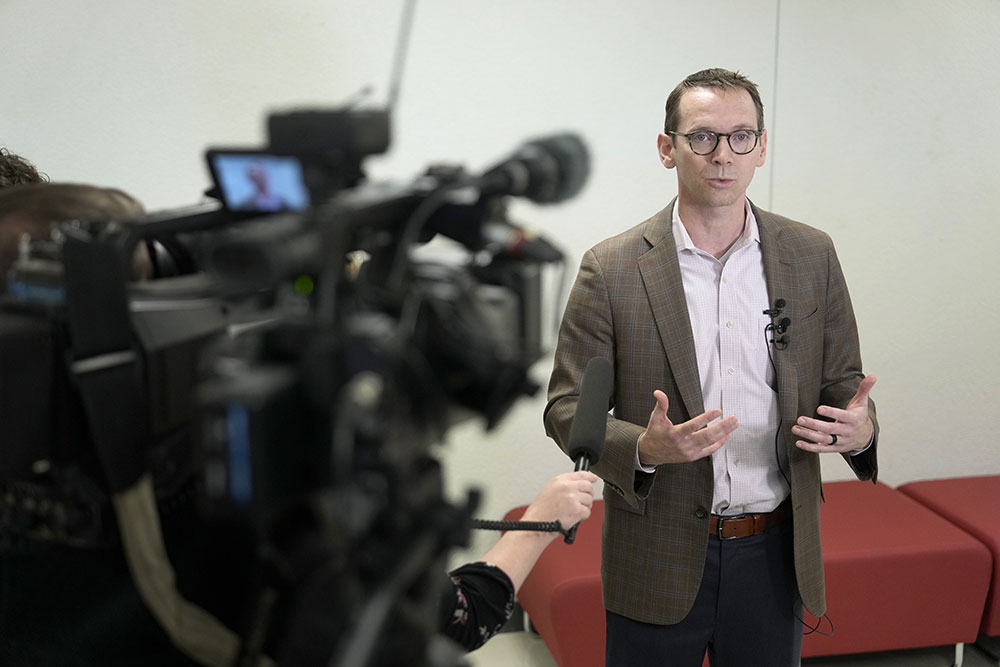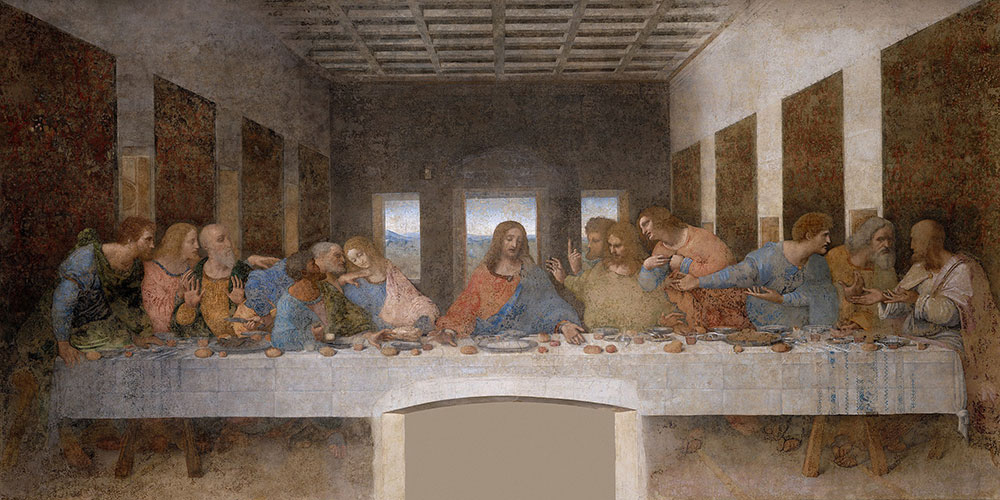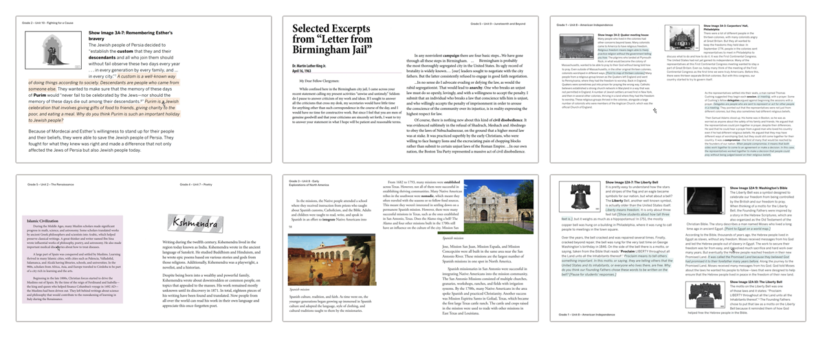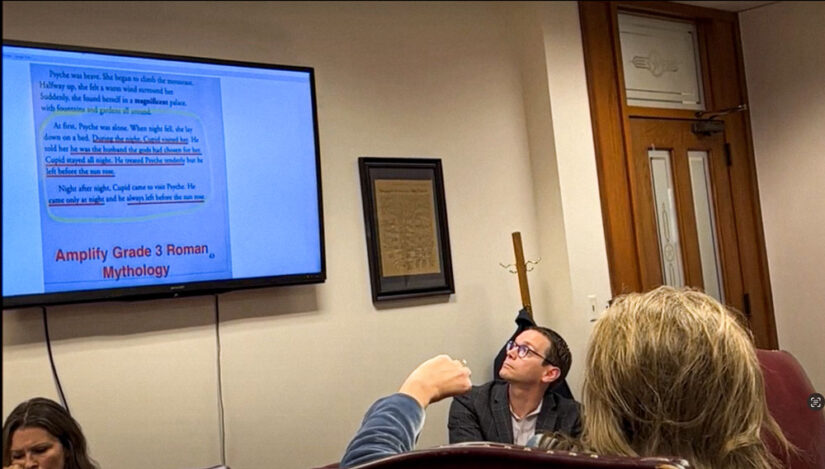Exclusive: Texas Seeks to Inject Bible Stories into Elementary School Reading Program
The move has the potential to bring classical education to over 2 million students, but raises questions about ‘religious and ideological agendas.’
Texas elementary school students would get a significant dose of Bible knowledge with their reading instruction under a sweeping curriculum redesign unveiled Wednesday.
From the story of Queen Esther — who convinced her husband, the Persian king, to spare the Jews — to the depiction of Christ’s last supper, the material is designed to draw connections between classroom content and religious texts.
“If you’re reading classic works of American literature, there are often religious allusions in that literature,” state education Commissioner Mike Morath told The 74. “Any changes being made are to reinforce the kind of background knowledge on these seminal works of the American cultural experience.”

With the potential to reach over 2 million K–5 students in the nation’s second-largest state, the update marks a big step in a movement embraced by conservatives to root young people’s education in what they consider traditional values. But it’s bound to raise questions about the potential for religious indoctrination in a state that has been a battleground for such disputes. Last year, for example, Texas passed a law allowing chaplains to work as school counselors.
“It is reasonable to devote some attention to [the Bible], and state education standards across the nation often require such attention,” said Mark Chancey, a religious studies professor at Southern Methodist University in Dallas. “The problem, of course, is that sometimes the legitimate reason of cultural literacy is used as a smokescreen to hide religious and ideological agendas.”
In an interview with a Christian talk show, GOP Lt. Gov. Dan Patrick, who describes himself as a “Christian first, conservative second,” praised the curriculum changes, saying they will “get us back to teaching, not necessarily the Bible per se, but the stories from the Bible.”
The release comes four days after the state Republican party passed a platform calling on the legislature and the state Board of Education to require instruction on the Bible. Texas education department officials declined to comment on the platform and have emphasized that the new curriculum includes material from other faiths.
While largely hidden from public view, the redesign sparked behind-the-scenes debate long before its release. When a leading curriculum publisher balked at the state’s request to infuse its offerings with biblical content, Texas officials turned to other vendors. They include conservative Christian Hillsdale College in Michigan and the right-leaning Texas Public Policy Foundation, which supported an unsuccessful effort to require the 10 Commandments in every classroom, according to a list obtained by The 74.

‘Great works of literature’
Going far beyond typical reading and writing fundamentals, the new lessons draw on history, science and the arts — “what many people call this classical model of education,” Morath said.
To understand “Number the Stars,” a book about a Jewish family hiding in Denmark during World War II, he said students should understand more about “Jewish cultural practices” and “the vilification of this ethnic minority.”
A unit on “Fighting for a Cause,” one of several that officials shared with The 74, includes the Old Testament story of Esther and how she and her cousin Mordecai “fought for what they knew was right and made a difference that not only affected the Jews of Persia but also Jewish people today.”
The mentions range in size from a page on Esther to a few paragraphs about Samuel Adams at the Continental Congress. His plea to fellow delegates to pray together, despite religious differences, is offered as a first-grade vocabulary lesson on the word “compromise.”
Fifth graders are asked to read Martin Luther King Jr.’s “Letter from Birmingham Jail.” Written after his 1963 arrest for leading a march against segregation, King compared his act of civil disobedience to the “refusal of Shadrach, Meshach and Abednego to obey the laws of Nebuchadnezzar” in the Book of Daniel.

“If you don’t know who Nebuchadnezzar is, you don’t know what [King’s] talking about,” Morath said. “How do you make sure that you can unlock in the minds of our kids their ability to wrestle with … ideas that have surfaced in great works of literature?”
Not just literature, but art. A lesson on “The Last Supper,” da Vinci’s Renaissance masterpiece, points fifth graders to the New Testament.
“The Bible explains that Jesus knew that after this meal, he would be arrested, put on trial, and killed,” the text reads. “Let’s read the story in the book of Matthew to see for ourselves what unfolded during the supper.”

While drawing parallels to religious texts, Morath said the lessons would respect bright lines regarding the separation of church and state.
“This is still a curriculum for public school and we’ve designed it to be appropriate in that setting,” he said.

Slideshow: New religious-related material in a proposed Texas elementary school reading program includes Old Testament references to the Liberty Bell, an exploration of the meaning of the Jewish holiday Purim and the story of Christ’s last supper. (Texas Education Agency)
The role of Amplify
The redesign builds on a $19 million K-5 English language arts curriculum delivered during the pandemic by Amplify, a leading publisher based in New York.
Roughly 400 districts have used their materials since 2021. Some teachers give them high marks for building students’ vocabulary and comprehension. But not everyone has been pleased. Last year, Morath met with conservative parents who decried its emphasis on mythology and minimal attention to Christianity.
“There’s one mention of Jesus, that he was a teacher a couple thousand years ago,” said Jamie Haynes, who runs a website on “concerning” curriculum and library books. “The only other time we can find God, our God — the God of Abraham, Isaac and Jacob — is in the American unit.”

The issue of how — and whether — to incorporate religious content was fraught long before the curriculum reached school districts.
State officials asked Amplify to provide a lesson on the story of Esther and suggested a unit on Exodus, said Alexandra Walsh, the company’s chief product officer.
While it had previously tweaked its curriculum for other states, Walsh said the company had never been asked to add biblical material. And when it suggested inserting content from other world religions, the state rejected the idea, said Amplify spokeswoman Kristine Frech.
“There was not much appetite for a variety of wisdom texts,” she said. “There was much more of an appetite for the tie to traditional Christian texts.”
The company opted against bidding on a contract to provide additional revisions. In a statement, Texas education officials dismissed Amplify’s charge that they turned down material from other religions as “completely false” and stressed that the finished product “includes representation from multiple faiths.” But the state declined to specify how many of the new lessons have religious themes or derive from Judeo-Christian sources.

In an interview with The 74, Morath pointed to a World War II lesson that focuses on J. Robert Oppenheimer’s famous reaction upon witnessing the explosion of the first atomic bomb in Los Alamos: “Now, I am become Death, the destroyer of worlds.” The words, featured prominently in the recent Oscar-winning film, derive from the Bhagavad Gita, a Hindu scripture.
Kindergarteners studying the Golden Rule would learn that the idea comes from the “Christian Bible,” according to the text, but that similar principles can be found in the “ancient books” of Islam and Hinduism. Another section on the Renaissance highlights Muslim settlers in Spain and their contributions to philosophy, poetry and astronomy.
‘Biblical literacy’
After Amplify bowed out, the state awarded an $84 million contract to the Boston-based Public Consulting Group to revise the curriculum.
For the reading program, the company worked closely with several authors who specialize in Texas history, including its role in westward expansion and launching the national space program, according to a list of vendors provided by the state.
But it also leaned on conservative organizations steeped in the culture wars. Contracts went to two officials at the Texas Public Policy Foundation: Courtnie Bagley, the think tank’s education director, and Thomas Lindsay, a higher education director and vocal opponent of diversity, equity and inclusion initiatives. The foundation, which called the 10 Commandments bill an “important step in bringing faith-based values back to the forefront of our society,” declined to comment on their contributions. Public Consulting Group officials also did not respond to questions.
Hillsdale, another vendor, is a major player in advancing classical education. It authored the 1776 Curriculum, a civics and history model that emphasizes American exceptionalism and is a favorite of conservatives opposed to lessons on institutional racism. When the Florida Department of Education rejected dozens of math textbooks in 2020, citing content influenced by critical race theory, a Tampa Bay Times/Miami Herald analysis showed two Hillsdale representatives objected to the proposed materials.
The state did not respond to questions on the role Hilldale and the Texas Public Policy Foundation played in the new curriculum. Hillsdale officials said they provided their feedback free of charge.
“Hillsdale never profits from its work in K-12, nor does it accept one penny from federal, state or local taxpayers,” said spokeswoman Emily Davis. She added, “Religion is taught for the sake of cultural literacy, not to promote a particular religion.”
Originally the province of well-heeled private or parochial schools, classical education has blossomed in recent years both as a response to pandemic lockdowns and what some parents view as progressive trends in traditional public schools. The philosophy is rooted in the liberal arts and historical texts, with a sharp focus on the Greek and Roman foundations of Western civilization.
They're going to need to have some biblical literacy, if only to interpret John Milton, or Dante or Shakespeare.
Robert Jackson, Flagler College
The movement entertains healthy debate about the role of religion, but most practitioners agree that giving students a strong body of knowledge requires the use of primary sources, including the Bible.
“They’re going to need to have some biblical literacy, if only to interpret John Milton, or Dante or Shakespeare,” said Robert Jackson, a senior research fellow with the Institute for Classical Education at Florida’s Flagler College.
‘Devotional in nature’
In Texas, the proposed changes would go far beyond any previous attempt to inject biblical content into its classrooms.

A 2007 state law allows school districts to offer high school electives on the Bible. Demand has been extremely low, however. According to the Texas Education Agency, just over 1,200 of the state’s 1.7 million high school students took the course this year.
But even with their limited scope and popularity, the courses offer ample fodder for skeptics. Writing for the Texas Freedom Network, a religious liberty and civil rights organization, Chancey, the Southern Methodist professor, found the courses to be “explicitly devotional in nature.” Despite requirements for teachers to complete special training and maintain “religious neutrality,” Chancey wrote that the Protestant Bible was the preferred text in these courses, while Catholic, Hebrew and Eastern Orthodox Bibles were “presented as deviations from the norm.” In several districts, the courses were taught by local ministers.
Sometimes the legitimate reason of cultural literacy is used as a smokescreen to hide religious and ideological agendas.
Mark Chancey, Southern Methodist University
The state is now working with a much larger canvas: not a mere elective, but an entire elementary reading curriculum, with a potential audience of millions of students.
Officials are quick to point out that adoption of the new program is voluntary. But a potential $60 per-student incentive it is offering for participation may make it difficult for cash-strapped school systems to refuse.
The updated materials are now open for public review and are scheduled to go before the state Board of Education for approval this fall. Aicha Davis, a Democrat on the Republican-led board, predicted “they would totally support something like that.”
“It doesn’t surprise me that this is happening,” she said.
Get stories like these delivered straight to your inbox. Sign up for The 74 Newsletter

